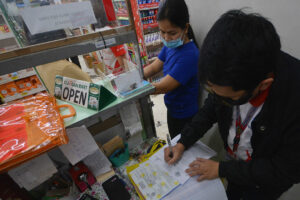




Philippines Trade Update: Imports weaken on tepid demand
 DOWNLOAD
DOWNLOAD

Policy Rate Updates: BSP outlook — cloudy with a chance of rate cut
 DOWNLOAD
DOWNLOAD

January Economic Update: Growth slows, prices rise
 DOWNLOAD
DOWNLOAD


PH posts lowest VAT efficiency in region

The Philippines should improve its value-added tax (VAT) collection as it continues to have the lowest efficiency level in Southeast Asia, Finance Secretary Benjamin E. Diokno said.
In a televised Palace briefing on Tuesday, Mr. Diokno said that the Philippine government tapped the International Monetary Fund (IMF) to study how it can further improve VAT collection.
“We asked the International Monetary Fund to conduct a study where we can improve on broadening the tax base. Maybe find areas where we can recover the exemptions,” he said.
He noted the Philippines has the lowest VAT efficiency among its Association of Southeast Asian Nations (ASEAN) neighbors, despite having the region’s highest VAT rate at 12%.
“While it has the highest VAT rate, compared to other countries in this part of the world, our VAT collection is the most inefficient,” Mr. Diokno said.
VAT efficiency refers to the ratio of VAT collection to total consumption, divided by VAT rate.
From 2016 to 2020, the Philippines’ VAT efficiency was 0.40, data from the Department of Finance (DoF) showed.
In the same period, the Philippines collected an average of PHP 723 billion from VAT, which is just 40% of the expected VAT collection.
The Philippines’ VAT efficiency is also below the ASEAN average of 0.57. Among Southeast Asian countries, Thailand has the highest VAT efficiency at 0.79 and the lowest VAT rate at 7%, followed by Singapore with a 0.71 efficiency and VAT rate of 8%.
Mr. Diokno attributed the low efficiency to the numerous VAT exemptions granted by the government.
“The Philippine tax system is also plagued with exemptions that are outside the Tax Code, which further complicates tax administration and dilutes the tax base,” he said.
Prior to the passage of current tax reforms, the Finance chief said the previous Tax Code contained 56 lines of tax exemptions and 84 additional exemptions in special laws.
Mr. Diokno also cited a World Bank study in 2018 that showed VAT exemptions resulted in revenue losses of up to PHP 539 billion.
According to the study, the government should have collected PHP 1.307 trillion in VAT revenues that year, but only raised PHP 768 billion or 58.8% of the potential revenues.
The Finance secretary said he prefers consumption taxes over income taxes, as they are based on spending rather than wealth.
Citing a study by the Organisation for Economic Co-operation and Development, Mr. Diokno noted that consumption taxes are also “less vulnerable to effects of globalization.”
“VAT is the best tax in the world. It’s being imposed by 90% of the countries in the world. It’s our interest to improve the efficiency of the VAT in the Philippines,” he added.
VAT zero-rating
Meanwhile, Mr. Diokno also noted that the government will also continue to limit VAT zero-rating to exporters.
Registered export enterprises can avail of the VAT zero-rating on local purchases of goods and services directly and exclusively used in their registered activities.
However, domestic market-oriented enterprises are not entitled to the VAT zero-rating.
In his presentation at the Palace, Mr. Diokno said that goods produced by exporting firms are consumed outside the Philippines, which means they are not subjected to VAT. On the other hand, domestic market enterprises produce goods for local consumption and are subject to VAT.
Mr. Diokno also noted that the distinction between registered exporters and domestic-market enterprises should remain to “preserve the integrity of the tax framework.”
“The most recent reform favors giving incentives to export-oriented firms, the reason being, if you are an export firm, you’re competing with the rest of the world, so you shouldn’t be put at a disadvantage. This is why we help those who are export-oriented and why we tax domestic firms,” he added. — By Luisa Maria Jacinta C. Jocson
This article originally appeared on bworldonline.com





 By BusinessWorld
By BusinessWorld